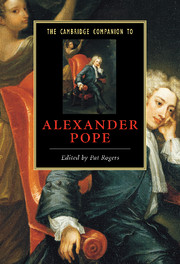Book contents
- Frontmatter
- Introduction
- 1 Pope, self, and world
- 2 Pope’s friends and enemies: fighting with shadows
- 3 Pope’s versification and voice
- 4 Poetic spaces
- 5 Pope’s Homer and his poetic career
- 6 Pope and the classics
- 7 Pope and the Elizabethans
- 8 Pope in Arcadia: pastoral and its dissolution
- 9 Pope and ideology
- 10 Pope and the poetry of opposition
- 11 Crime and punishment
- 12 Landscapes and estates
- 13 Money
- 14 Pope and the book trade
- 15 Pope and gender
- 16 Medicine and the body
- 17 Pope and the other
- Further reading
- Index
Introduction
Published online by Cambridge University Press: 28 April 2008
- Frontmatter
- Introduction
- 1 Pope, self, and world
- 2 Pope’s friends and enemies: fighting with shadows
- 3 Pope’s versification and voice
- 4 Poetic spaces
- 5 Pope’s Homer and his poetic career
- 6 Pope and the classics
- 7 Pope and the Elizabethans
- 8 Pope in Arcadia: pastoral and its dissolution
- 9 Pope and ideology
- 10 Pope and the poetry of opposition
- 11 Crime and punishment
- 12 Landscapes and estates
- 13 Money
- 14 Pope and the book trade
- 15 Pope and gender
- 16 Medicine and the body
- 17 Pope and the other
- Further reading
- Index
Summary
It would not be quite true to say that Pope has proved a poet for all the ages, if only because some late Victorians thought him safely dead and buried in terms of any active presence in the poetry of their day. Even then, however, Pope refused to lie down, and for the past three hundred years he has shown surprising resilience in the face of condescension, assumed indifference, or outright hostility. Recent generations of poets and critics have joined the scholars in helping to recover some of the ground he had lost. A look at his reputation as it stood 100, 200, and 300 years ago may help to make the point.
In the first quarter of the eighteenth century, Pope had seen his career take off with a series of major poems: An Essay on Criticism, Windsor-Forest, The Rape of the Lock, and Eloisa to Abelard, which would all be packaged in the sumptuous collection of the poet's Works in 1717. Scarcely anyone without a personal grudge then doubted that a poet of the highest excellence had arrived on the scene - in the view of most dispassionate observers, the greatest English writer since Milton and Dryden in the late seventeenth century. A hundred years later, in the first quarter of the nineteenth century, his position had undergone serious challenge, but he remained a potent influence for Wordsworth, and earned the vehement support of Byron:
Neither time, nor distance, nor grief, nor age, can ever diminish my veneration for him, who is the great moral poet of all times, of all climes, of all feelings, and of all stages of existence. The delight of my boyhood, the study of my manhood, perhaps (if allowed to me to attain it), he may be the consolation of my age. His poetry is the Book of Life.
- Type
- Chapter
- Information
- The Cambridge Companion to Alexander Pope , pp. 1 - 13Publisher: Cambridge University PressPrint publication year: 2007



